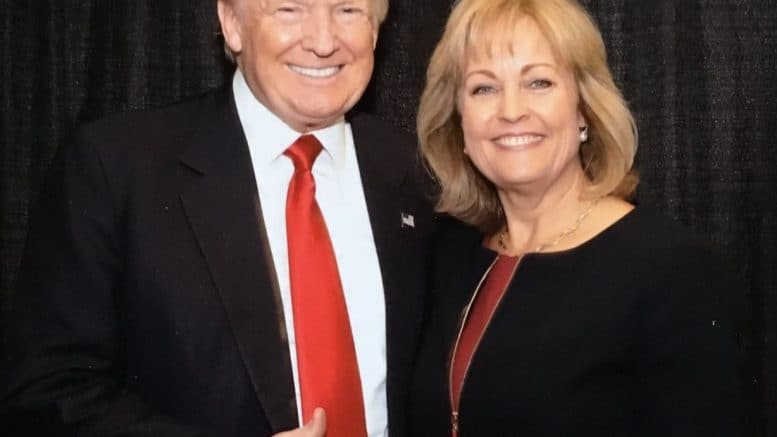In full disclosure, I voted for Kathy Szeliga in the 2016 U.S. Senate race against Chris Van Hollen. At that time, Kim and I believed that Szeliga, a Baltimore-based state legislator, represented some of our political values – more so than Chris Van Hollen.
Today, however, I am second guessing my support for Szeliga.
Kim and I looked to Szeliga to be a role model, at the very least, or an image of a role model for our daughter, Paige, who, last year, was turning ten around the time of the November election.
Maryland has plenty of talented women in elected office but none of them are serving in Maryland’s federal delegation. We put our faith and trust into Szeliga, and we thought that she would speak up and speak out for women, regardless of their political affiliation.
After all, Szeliga was running for the seat held by the longtime and incredibly respected former U.S. Sen. Barbara Mikulski. Say what you want about Senator Barb, but you can’t say she didn’t support women, and you most certainly cannot say that she failed to stand up for women – regardless of their political affiliation.
I do not know Kathy Szeliga well. My limited interactions with the House Minority Whip have left me thinking that she is an affable, pleasant, well-informed and decent human being. And I thought, at the time, she would have made a formidable U.S. senator.
Szeliga – who, last year, occasionally found it politically convenient as a Republican woman running for a statewide office in deep blue Maryland to speak out against her Party’s presidential nominee – has now fully embraced Trump and is becoming a mean girl in Maryland politics.
Maya Rockeymoore Cummings, a policy consultant and a former Capitol Hill Staffer who is married to U.S. Rep. Elijah Cummings (D-Md.), announced this past Thursday that she is entering Maryland’s Democratic gubernatorial primary, making her the eighth candidate vying to unseat Maryland’s exceptionally popular Republican governor, Larry Hogan.
It’s evident that Szeliga and Rockeymoore Cummings have little in common with respect to their political beliefs. Rockeymoore Cummings, who is still largely an unknown inside of Maryland politics, will most likely run her campaign as a progressive Democrat. Szeliga, on the opposite of the political spectrum, is a conservative Republican.
But take politics out of the calculus for just a moment.
Instead of exhibiting class and decency and welcoming a fellow woman into a Maryland statewide race – all political differences aside, of course – Szeliga, taking her cues from Donald Trump, this past Thursday hit Rockeymoore Cummings, an African-American female, below the belt by attacking her via a petty Facebook post, writing,
Elijah Cumming’s wife running for MD gov. – she likes fancy words – ‘minutiae’ to let us know how smart she is – ‘I have a Ph.D. in political science with an emphasis on public policy,’ she said. ‘I am confident on mastering any minutiae when it comes to government and policy.
Forget Szeliga’a lowbrow attack on “Elijah Cummings’ wife,” her comments, while perhaps unintentional, tinker on racism. Was Szeliga asking ‘how could African-American women be smart?’
A well-educated African-American woman running for governor of Maryland – the state of Maryland, incidentally, has one of the most educated workforces in the country – used the word ‘minutiae (which is an unfancy way of saying ‘a minor detail,’ [shamless plug]), and Szeliga characterizes her words as “fancy.”
Szeliga did manage to stop short of calling Rockeymoore Cummings “uppity.” Perhaps we could celebrate her modicum of restraint.
How did we get to the point where it is considered a political liability for politicians and political leaders to speak and write well and who have advanced degrees in political science?
Why are Republicans these days embracing the culture of anti-intellectualism?
What has happened to our country? At one time, our American politicians and leaders aspired to intelligence. Intelligence was once a cornerstone prerequisite for public office.
Remember the opening scene from HBO’s The Newsroom when fictional cable news anchor Will McAvoy told the young Columbia Journalism School student that America was no longer the greatest country in the world – but we can be?
“We stood up for what was right. We fought for moral reasons, we passed and struck down laws for moral reasons. We waged wars on poverty, not poor people. We sacrificed, we cared about our neighbors, we put our money where our mouths were, and we never beat our chest. We built great big things, made ungodly technological advances, explored the universe, cured diseases, and cultivated the world’s greatest artists and the world’s greatest economy. We reached for the stars, and we acted like men.
We aspired to intelligence; we didn’t belittle it; it didn’t make us feel inferior. We didn’t identify ourselves by who we voted for in the last election, and we didn’t scare so easy. And we were able to be all these things and do all these things because we were informed. By great men, men who were revered.”
McAvoy said it best: “The first step in solving any problem is recognizing there is one—America is not the greatest country in the world anymore.”
Our country’s political dialogue has been downgraded so much since Donald Trump has been elected that now it seems one half of our country is full of intellectually challenged and morally bankrupt people, unwilling or incapable of calling out the political hypocrisy that consumes our day-to-day chatter.
Can you deny that our political culture is spiraling out of control?
At what point in our American culture did we become so defined by the person for whom we voted for in the last election? At which point in our American narrative did dialogue become incapable between dissenting forces? When did we stop listening to one another? At what point did intelligence become a net negative for our politicians?
If the roles were reversed and Del. Szeliga used the word minutiae and Ms. Cummings responded as Szeliga did, Cummings would be mocked as uneducated, followed by some disgusting racial – wait for it, another big word – epithets.
But when Rockeymoore Cummings says “minutiae,” she was mocked by Szeliga as being over-educated. As if over-education is a bad thing in our political culture these days.
Don’t we want the smartest people to represent us and make policy? Don’t we want the brightest and the best? Our republic was set up so that common men and women, educated nonetheless, could represent our values and beliefs in public office. This is the essence of our republic.
But that’s what double standards are for – to make sure that the person to whom it applies can never win. Most women in professional jobs have been introduced to these same double standards, and I would expect that African Americans and other minorities have figured out this inconvenient fact long before Szelgia decided to be a mean girl on Facebook.
Bottom line: Making fun of someone for simply stating their qualifications for a job is fundamentally disgusting. It’s wrong. It’s petty. It’s beneath Kathy Szeliga.
One Washington Post commentator said it best:
“When, in our political culture, did it become fashionable to tear down the educated among us, whether it be due to lack of understanding, impatience, or even resentment.
And it’s been cheered along by a political class (mostly the Republican Party) all too willing to take the easy route by opting for reductionist messages and hand-picked facts, all the while decrying the notion that anything is complex or, god forbid, difficult.
Add to that their drumbeat of lies directed towards the country’s “average Joes,” selling them on the delusion that the guy down the road who fixes their lawn equipment can also fix all of America’s problems, helps a lot to explain why things like the election of Donald Trump became possible. Our political discourse and a large chunk of the people dominating it are a massive, raging, intellectually lazy and dishonest Dunning-Kruger effect.”
I don’t think for a second that Del. Szeliga is a racist. She’s just not. But her comments were wrong. She should be cognizant that her words elicited some visceral reactions from many African-American Marylanders – including some well-known African-American Republicans.
Del. Szeliga should apologize publicly for her unfortunate remarks and issue a statement that clarifies her original Facebook posting. That would be the decent thing to do.
I welcome and embrace any educated woman – black, white, Latino, Asian, etc. – to run for public office in Maryland. Our daughters are watching. It’s their generation for which we have something to prove.
Educated women who step up to the plate and run for public office should be celebrated, not degraded.
Welcome to the gubernatorial race, Dr. Rockeymoore Cummings. I look forward to learning more about your platform and policies.
Go get em’.





Be the first to comment on "Kathy Szeliga took the low road"